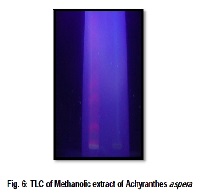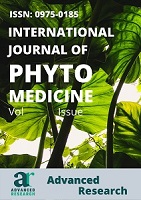Eradicating potential of Achyranthes aspera
Keywords:
Achyranthes aspera, methenolic extract, antioxidant activity, quantitative analysisAbstract
The antioxidant activity of Achyranthes aspera methanolic aerial part extracts was investigated using the 2,2-diphenyl-1-picrylhydrazyl (DPPH) free radical-scavenging and ferric-reducing antioxidant power assays. Quantitative estimation of total flavonoid and phenolic content was performed followed by thin layer chromatography (TLC) to confirm the presence of secondary metabolites in the extract. From results of DPPH and ferric-reducing antioxidant power assays, it was found that methanolic aerial part extracts of Achyranthes aspera precipitates strong antioxidant (P < 0.005) activity compared to the ascorbic acid. The concentrations of total flavonoid and total phenolic content were found to be 47.6 mg RuE/g and 28.66 mg GAE/g respectively. The TLC study showed distinguished spots and revealed the presence secondary metabolites.
References
. Badami S, Gupta M.K, and Suresh B,
Antioxidant activity of ethanolic extract
of Striga orobanchioides. J.
Ethnopharmacol. 2003; 85: 227-230.
. 2. Hazra B, Santana B, Nripendranath
M. Antioxidant and free radicals
scavenging activity of Spondias
pinnata. J. BMC. 2008; 8: 63.
. Jose A. Yuri. Antioxidant activity and
total phenolics concentration in apple
peel and flesh is determined by
cultivar and agroclimatic growing
regions in Chile Journal of Food,
Agriculture & Environment 2009; 7 :
-517.
. .Valko M, Leibfritz D, Moncola J,
Mazura M, Telser J. Free radicals and
antioxidants in normal physiological
functions and human disease.
International Journal Biochemistry
Cell Biology, 2007; 39, 44–84.
. Huda-Faujan, N, Noriham, A,
Norrakiah A. S, Babji A. S.
Antioxidant activity of plants
methanolic extracts containing
phenolic compounds. African Journal
of Biotechnology. 2009; Vol. 8 (3): pp.
-489
. Sumazian Y, Syahida A, Hakiman M,
Maziah M, Antioxidant activities,
flavonoids, ascorbic acid and phenolic
contents of Malaysian vegetables. J.
Med. Plant. Res. 2010; 4(10): 881-
. T Sun; Ho CT. Antioxidant and
Antibacterial Activities of Various
Extracts and Fractions of Fresh Tea
Leaves and Green Tea . Food
Chemistry, 2005; 90: 743-749.
. Suhaj M. Spice antioxidants isolation
and their antiradical activity: a review.
Journal of Food Composition and
Analysis, 2006; 19: 531-537.
. Hirose M, Imaida K, Tamano S, Ito, N.
Cancer chemoprevention by
antioxidants. In “Food Phytochemicals
for Cancer Prevention II”. 1994; 122-
. Girach RD, Khan ASA.
Ethnomedicinal uses of Achyranthes
aspera leaves in Orissa (India). Int J
Pharmacogn.1992; 30:113-115.
. Liersch Bkher. Achyranthes. In:
Haensel R, Keller K, Rimpler G,
Schneider G (eds) Hagers Handbuch
der Pharmazeutischen Praxis. V.
Springer-Verlag. Berlin7, 1992; 54-59.
. Jain SK. Dictionary of Indian folk
medicine and ethnobotany. Deep
Publications, New Delhi, India.1991.
. Bhom KH, Liersch R, Haensel R,
Keller K, Rimpler H. Schneider
(Eds.).G, Hagers Handbchder
Pharmazeutischen Praxis Springer
Verlag. Berlin. 1992;5,54-59.
. Vasudeva N, Sharma SK. Estrogenic
and pregnancy interceptory effects of
Achyranthes aspera Linn. Root.
J.Ethanopharmacol. 2006;179.
. Paul D, Bera S, Jana D, Maiti R.
Ghosh.D. In Vitro determination of
the contraceptive spermicidal activity
of a composite extract of Achyranthes
aspera and Stephania hernandifolia
on human semen. Contraception.
; 73:284-288.
. Mohammad SA Javed I. evaluation of
hypoglycemic effect of Achyranthus
aspera in normal and alloxan diabetic
rabbit. Journal of
Ethanopharmacology 1991; 31(1):49-
. Chang C, Yang M, Wen H, Chern J.
Estimation of total flavonoid content in
propolis by two complementary
colorimetric methods. J. Food Drug
Anal. 2002; 10: 178-182
. McDonald S, Prenzler PD, Antolovich
M, Robards K Phenoliccontent and
antioxidant activity of olive extracts.
Food Chem. 2001; 73:73-84.
. Koleva II, Van Beek TA, Linssen JPH,
Screening of plant extracts for
antioxidant activity: a comparative
study on three testing methods.
Phytochem. Anal. 2002; 13: 8-12.
. Athukorala Y, Kim KN, Jeon YJ.
Antiproliferative and antioxidant
properties of an enzymatic
hydrolysate frombrown alga Ecklonia
cava. Food Chem. Toxicol. 2006; 44:
-1074.
. Yen, G. C., & Duh, P. D. Antioxidative
properties of methanolic extracts from
peanut hulls. Journal of the American
Oil Chemists Society. 1993; 70, 383–
. Wagner H, Bladt S, zgainski E M.
Plant drug analysis. A thin layer
chromatography atlas, springer.
germany, 2nd edn, 1984.
. Shahidi F, Wanasundara PKJPD.
Phenolic antioxidants. Critical
Reviews in Food Science and
Nutrition Critical Reviews in Food
Science and Nutrition. 1992; 32: 67-
. Halliwell B Free radicals, antioxidants
and human disease: curiosity, cause,
or consequence Lancet 1994; 344:
-724



